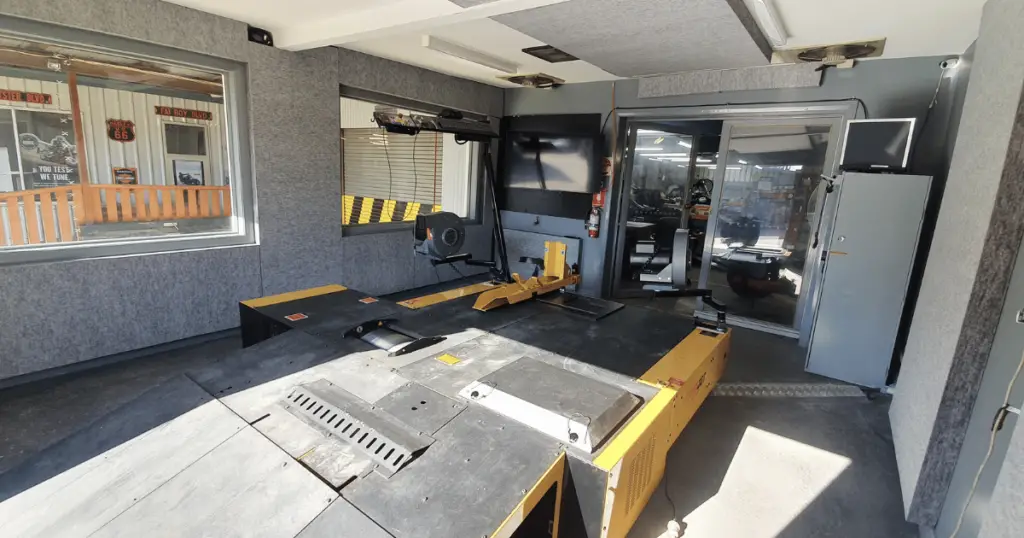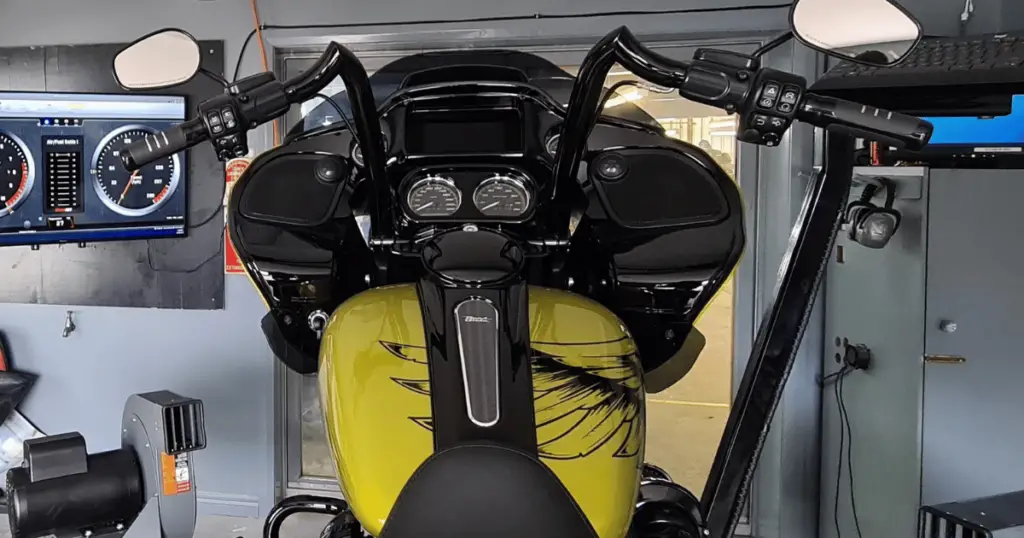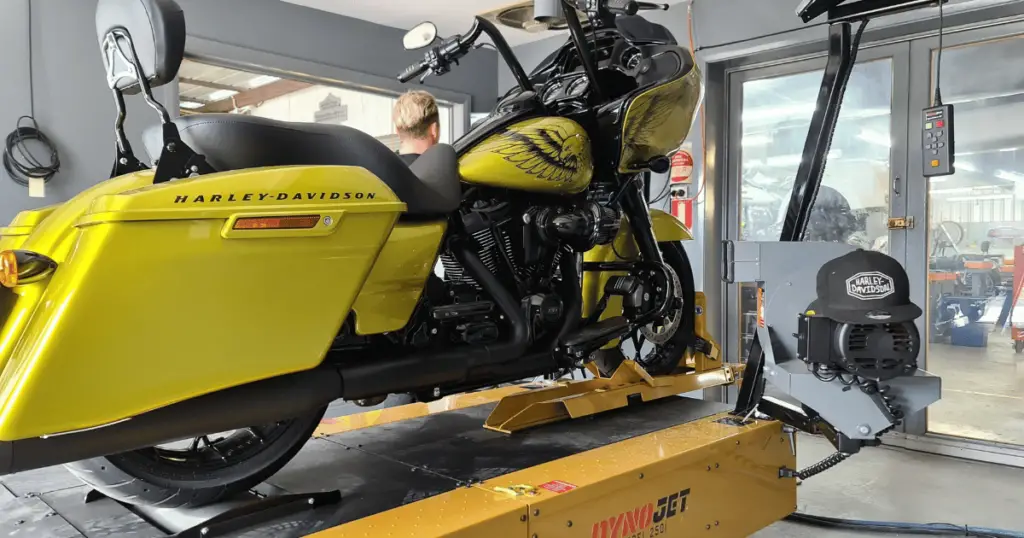Rumble on the open road with impeccable power and unmatchable smoothness; therein lies the soul of every Harley-Davidson motorcycle. But achieving this perfect harmony of performance commands a keen understanding of your ride, particularly when it’s about getting a dyno tune. As we vroom into 2024, knowing the cost breakdown of the complete Harley dyno tune cost is no casual interest, but a necessity for every true biker. It’s not just about pumping up your Big V-Twin for more horsepower. It’s about understanding the nuances that render that intangible connect between man and machine. This guide, intricately detailed yet effortlessly understandable, peels back the layers on what you can expect to shell out in 2024 for a Harley dyno tune. So sit back, let your chrome horse rest as we divulge the secrets of optimizing your ride without riding roughshod over your budget. Because a true Harley rider knows, power doesn’t always have to come at a premium.
What’s The Average Harley Dyno Tuning Cost?
The average cost for a Harley Dyno tuning session ranges between $400 and $500. This cost includes the labor time required for the tuning professional to install, tune, and Dyno the bike. It’s important to remember that this is just an average, as the price can vary based on several factors, including the model of the bike, the specific tuning requirements, and the location of the tuning shop.

Factor Breakdown of The Cost to Dyno Tune Harley Motorcycles
The cost of Dyno tuning a Harley motorcycle is influenced by several factors. Here’s a breakdown of the most significant cost contributors:
Purchasing a Tuning Module or ECU Programmer (Price Range $300-$1000)
The tuning device or Electronic Control Unit (ECU) programmer is a crucial component in the Dyno tuning process. These devices, which include popular models like Dynojet Power Commander, Harley-Davidson Pro EFI Race Tuner, and Maximus by Technoresearch, range in price from $300 to $1000. The ECU programmer allows the tuner to adjust the fuel and ignition maps of your motorcycle, resulting in optimal performance.
Labor Time To Install, Tune, and Dyno The Bike (3-8 Hours in Some Cases)
The labor cost for a Dyno tuning session is another significant expense. It’s estimated that a professional Dyno tuning session can take anywhere from 3 to 8 hours, depending on the complexity of the bike’s build and the tuning requirements. This labor cost can significantly increase the overall cost of Dyno tuning.
Is Tuning A Harley Worth It?
The answer to this question largely depends on your specific needs and expectations as a Harley owner. If you’re seeking improved horsepower, torque, and overall bike performance, After you’ve had your bike dyno tuned, you’ll realize it is definitely worth the investment. It ensures your bike is running at its optimal potential and can significantly enhance your riding experience.
Can You Tune A Harley Without Aftermarket Modifications?
While it’s possible to tune a Harley without aftermarket modifications, the benefits of Dyno tuning are most noticeable when performance mods are installed on the motorcycle. These could include an exhaust system and filters, which allow more air into the engine, resulting in increased power and speed. Without these modifications, the impact of Dyno tuning may be less significant. In this case, I’d recommend something like a power vision tuner which is capable of creating a custom MAP to provide some significant gains without additional modifications.
Or, here’s another option: Cobra Fi2000 PowrPro Tuner Review: Performance Unleashed

Brief Breakdown of Different Harley Stages (Stage Kits 1-4)
Harley-Davidson® offers different stage kits that can offer improved performance for your bike. Here’s a brief breakdown of these stages:
- Stage 1 involves upgrading the air intake and exhaust system, providing your Harley with more air to breathe.
- Stage 2 includes the addition of a performance camshaft, which changes the engine’s breathing characteristics.
- Stage 3 involves replacing the pistons and cylinders to increase the engine’s displacement.
- Stage 4 transforms your Harley into a high-performance machine, with a larger throttle body, high compression pistons, and performance cams.
Learn more: Harley Stage Kits Explained: Cost, Benefits and More
Is An Auto Tuner The Same As A Dyno Tune?
An auto tuner and a Dyno tune serve similar purposes – they both aim to optimize your motorcycle’s performance. However, they are not the same thing. An auto tune (sometimes referred to as a smart tune) adjusts your bike’s settings in real-time as you ride, while a Dyno tune involves a comprehensive, one-time tuning session in a controlled environment to optimize your bike’s performance.
Still, a tuner is a great alternative if you want to skip on the dyno tune:
– The Best Harley Davidson Tuner Is Revealed (+5 Alternatives)
– The Best Tuner For Milwaukee 8 114 Engines (+Alternatives)
– Best Tuner for M8 107: Unleash Optimal Performance and Power
– Best Tuner for Harley 110: Top Picks for Optimal Performance
– Best Tuner for Harley 103 Gets Revealed (By An Expert)
– Best Tuner for Harley 96: Power, Torque, and More
– Best Tuner for Harley 88 ci Engines: An Expert’s Picks

Can You Dyno Tune A Harley By Yourself? (No, But You Can Install an Auto Tuner)
Technically, Dyno tuning a Harley requires specialized equipment and expertise, making it difficult for the average rider to perform. However, you can install an auto tuner yourself, which in many cases is a sufficient equivalent to having your bike dyno tuned. Auto tuners are designed to be user-friendly and can be installed with a bit of mechanical know-how.
Here’s my favorite auto tuner on the market today, and a (non auto tuning) alternative to consider:
– ThunderMax Tuner Reviews: A Complete, In-Depth Analysis
– ThunderMax vs Power Vision Tuner Shootout
– ThunderMax vs Power Commander: Who Packs The Punch +Value?
– Dynojet Power Vision 4 Review: Top Performance Upgrade?
What Other Factors Need To Be Considered During The Tuning Process?
Several factors need to be considered during the tuning process. These include the bike’s air/fuel ratio, ignition timing, throttle response, and rev limit. Also, it’s important to remember that a power upgrade typically results in higher fuel consumption, as more fuel is injected into the combustion chamber.
To sum it up, while the cost of Dyno tuning a Harley might seem substantial, the performance gains can be worth the investment. Regularly tuning your motorcycle ensures optimal performance, leading to an enhanced riding experience.
all photos courtesy of Richardson’s Harley-Davidson